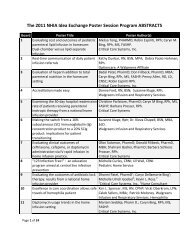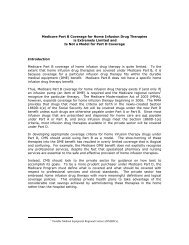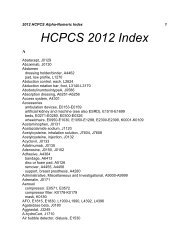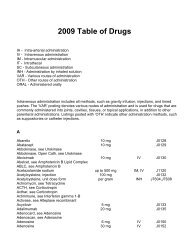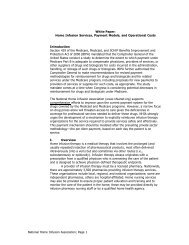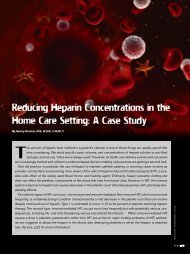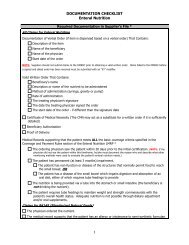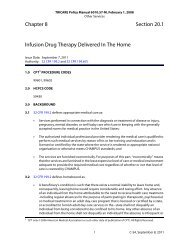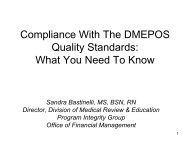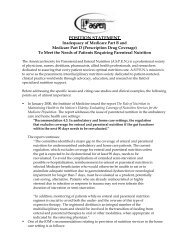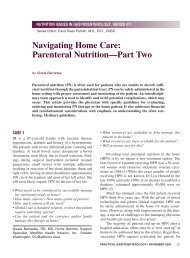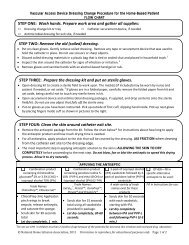Kaiser Family Foundation Survey on State Medicaid Managed Care ...
Kaiser Family Foundation Survey on State Medicaid Managed Care ...
Kaiser Family Foundation Survey on State Medicaid Managed Care ...
- No tags were found...
You also want an ePaper? Increase the reach of your titles
YUMPU automatically turns print PDFs into web optimized ePapers that Google loves.
Table 13 c<strong>on</strong>tinued<strong>State</strong>Descripti<strong>on</strong> of ArrangementDual eligibles must enroll in the KY Partnership (MCO) to receive <strong>Medicaid</strong>-<strong>on</strong>ly benefits, such asKentucky pharmacy and transportati<strong>on</strong>. They do not have to choose a primary care provider within thePartnership network and they retain their Medicare freedom-of-choice.Dual eligibles may voluntarily enroll in Senior <strong>Care</strong> Opti<strong>on</strong>s, which covers all <strong>Medicaid</strong> andMassachusetts Medicare benefits including primary, acute, pharmacy, behavioral health, community and facilitybasedservices and supports and care coordinati<strong>on</strong>.Michigan Dual eligibles must enroll in a behavioral health PHP.Enrollment in managed care is mandatory for most seniors. <strong>Medicaid</strong>-<strong>on</strong>ly seniors must enroll inMSC+. Dually eligible seniors may enroll in MSC+ or in MSHO. MSHO is an integrated<strong>Medicaid</strong>/Medicare product that includes health services as well as home and community-basedservices and a certain amount of nursing facility services. The state c<strong>on</strong>tracts for <strong>Medicaid</strong> serviceswith Medicare SNPs, so dual eligibles age 65 and older can receive all <strong>Medicaid</strong> and MedicareMinnesota services through a single MCO. Dual eligibles who are blind or disabled and age 18 to 64 mayvoluntarily enroll in Special Needs Basic <strong>Care</strong>, an integrated <strong>Medicaid</strong>/Medicare product thatincludes a certain amount of nursing facility services; pers<strong>on</strong>al care and home and communitybasedservices are available <strong>on</strong> a fee-for-service basis. Because the state c<strong>on</strong>tracts for <strong>Medicaid</strong>services with Medicare SNPs, blind and disabled duals aged 18 to 64 can receive <strong>Medicaid</strong> andMedicare services through a single MCO.Dual eligibles may voluntarily enroll in the PCCM program and are enrolled statewide <strong>on</strong> an optoutbasis in additi<strong>on</strong> to the voluntary enrollment. Also, the Community <strong>Care</strong> Networks haveNorth Carolinac<strong>on</strong>tracted directly with CMS for a Secti<strong>on</strong> 646 Dem<strong>on</strong>strati<strong>on</strong>.New Jersey Dual eligibles may voluntarily enroll in the New Jersey <str<strong>on</strong>g>Family</str<strong>on</strong>g><strong>Care</strong> program.New Mexico Dual eligibles must enroll in the managed l<strong>on</strong>g-term care program.Dual eligibles may voluntarily enroll in <strong>Medicaid</strong> Advantage, which offers a uniform Medicare AdvantageProduct and a supplemental <strong>Medicaid</strong> product that covers cost-sharing associated with MedicareNew YorkAdvantage, as well as inpatient mental health exceeding Medicare limits, limited n<strong>on</strong>-Medicare-coveredhome care, n<strong>on</strong>-emergency transportati<strong>on</strong>, and dental care plan opti<strong>on</strong>s.Oreg<strong>on</strong>Dual eligibles may voluntarily enroll in OHP Plus.Dual eligibles must enroll in behavioral health PHP. Dual eligibles are not enrolled in MCOs or thePennsylvaniaPCCM program <strong>on</strong> either a voluntary or a mandatory basis.South Carolina Dual eligibles may voluntarily participate in the Medical Home Network (PCCM).Dual eligibles receiving <strong>Medicaid</strong>-reimbursed l<strong>on</strong>g-term care (LTC) services are enrolled in theCHOICES program. Enrollment is voluntary, but it is required in order to receive <strong>Medicaid</strong>reimbursedLTC services; thus, in effect, it is mandatory. In additi<strong>on</strong>, all <strong>Medicaid</strong>-eligibleTennesseeindividuals (excluding PACE participants) are enrolled in a MCO for physical and behavioral healthservices. Two of the state's three MCOs also offer SNPs. At this time, Tenn<strong>Care</strong> has a Coordinati<strong>on</strong>Agreement with existing SNPs, primarily for purposes of data exchange.STAR+PLUS is a Texas <strong>Medicaid</strong> program offered in four service areas that integrates the delivery ofacute care services and community-based l<strong>on</strong>g-term services and supports to aged, blind, anddisabled (ABD) <strong>Medicaid</strong> recipients through a managed care system. STAR+PLUS operates underTexas<strong>on</strong>e 1915(b) and two 1915(c) waivers allowing the state to provide home and community-basedservices for Supplemental Security Income (SSI) eligible and SSI-related <strong>Medicaid</strong> clients, and tomandate managed care for clients aged 21 years and older. (Enrollment in STAR+PLUS is voluntaryfor clients aged 20 and younger.)Dual eligibles living in geographic areas where mandatory MCO enrollment is in place are requiredUtahto enroll in a health plan.Full dual eligibles (QMB-Plus and SLMB-Plus) may voluntarily enroll in the Washingt<strong>on</strong> <strong>Medicaid</strong>Washingt<strong>on</strong>Integrati<strong>on</strong> Partnership (which operates in <strong>on</strong>e county). Clients can opt-in or opt-out at any time.Wisc<strong>on</strong>sin Dual eligibles may voluntarily enroll in SSI managed care plans.Note: Not all states provided data <strong>on</strong> their enrollment of dual eligibles in <strong>Medicaid</strong> managed care.46 00



